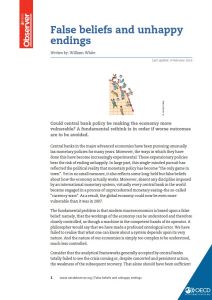Únase a getAbstract para acceder al resumen.

Únase a getAbstract para acceder al resumen.
William White
False Beliefs and Unhappy Endings
OECD, 2016
¿De qué se trata?
Discover why current monetary policy may pose the greatest risk to the economy since the 2008 crisis.
Recommendation
If you’re worried about another global recession, you won’t find any reassurance from economist William White, chairman of the OECD’s Economic and Development Review Committee. In this powerful article, he asserts that central bankers’ attempts to keep the economy on course are actually steering it into dangerous waters. He contends that loose monetary approaches don’t necessarily boost spending and that policy makers rely on flawed assumptions rather than on any real understanding of how the economy works. getAbstract highly recommends this intriguing report to economists, policy makers, executives and investors.
Summary
About the Author
William White is the head of the OECD’s Economic Development and Review Committee.
















Comment on this summary